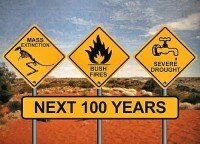Australian ETS chaos
Posted in Policy on 12/03/2009 02:36 am by So climate change has claimed a political victim in Australia and you don’t know whether to laugh or cry.
So climate change has claimed a political victim in Australia and you don’t know whether to laugh or cry.
You do though, for a start, have to admire the ousted Liberal (conservative) party leader Malcolm Turnbull. He said he didn’t want to lead a party that was sceptical about climate change and, because he stuck to his guns, he now doesn’t. One commentator has even called him a climate change martyr. That’s overdoing it, but he was trying to get his party to engage seriously with the issue and they have refused, for the time being.
The Labor Prime Minister Kevin Rudd wanted Parliament to approve his emissions trading scheme (ETS) before the Copenhagen summit. He needed Liberal support to get it through the upper house and Turnbull agreed after extracting extra concessions for CO2 intensive businesses. However, Turnbull couldn’t make the coalition, which he led, honour the deal. When he insisted, the revolt in his own ranks unseated him and now, Prime Minister Kevin Rudd, will now go to Copenhagen without the legislation in place to implement his scheme.
Does it matter that much? In the long run possibly not.
The targets for CO2 reduction are pretty modest and even Rudd accepts they may be toughened if there is international agreement. The Greens also opposed the ETS. So this policy may ultimately be overtaken by events. Anyone who believes in the need for radical action is bound to hope so.
What’s depressing about the events of the last few days is that it demonstrates the difficulty of getting bipartisan support for even a relatively modest attempt to tackle climate change. As a statement of intent, Labor’s ETS would have been worth having. However, Australia, with one of the most CO2 intensive economies in the world, has failed to speak with one clear voice. The reasons are equally depressing – it was a combination of climate change sceptics and outright deniers who unseated Turnbull and stalled the scheme.
The good news is that the way may now be clear for Labor to take on the sceptics and flatten – or at least marignalise – them. Turnbull’s place has been taken by Tony Abbott, a conservative Christian conviction politician. Although he reportedly once called climate change ‘crap’, he should not really be classed as a denier. As a straight talker of the kind many Australians warm to, he should not be underestimated either, but he is likely to be a divisive figure electorally and Labor will be sorely tempted to take advantage of that. Australia is due to go to the polls by the end of 2010 anyway and Kevin Rudd, whose popularity is still at record levels, may well call an election early in the New Year. The safe money right now would be on Labor getting a majority in both houses of parliament and so no longer needing to rely on Liberal and National Party support to get its legislation through.
Would Kevin Rudd use that freedom to strengthen the legislation? In a second term, maybe he would be less cautious and risk averse, but it is likely that Australia will only go as far as international agreements require it to.
But at least the sceptics and deniers might get the message that if they don’t want to be part of the solution, they’re not going to be in power either.
 Simon Morris has been a journalist for over 20 years. He currently lives in Sydney, where he is the Multimedia Editor for The Sydney Morning Herald online. He was formerly a Political Correspondent for BBC Wales. Moving from a country whose immense coal exports started the industrial practice of chucking CO2 into the atmosphere to a country whose immense coal exports continue the practice without the excuse of ignorance, he can see the need for practical solutions!
Simon Morris has been a journalist for over 20 years. He currently lives in Sydney, where he is the Multimedia Editor for The Sydney Morning Herald online. He was formerly a Political Correspondent for BBC Wales. Moving from a country whose immense coal exports started the industrial practice of chucking CO2 into the atmosphere to a country whose immense coal exports continue the practice without the excuse of ignorance, he can see the need for practical solutions!

